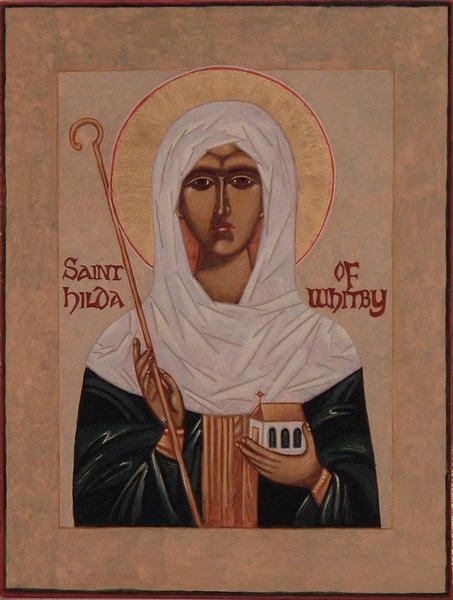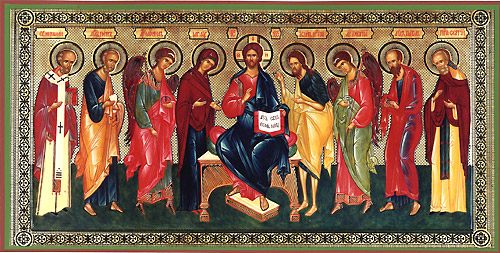Saint
GREGOIRE le Thaumaturge, évêque de Néo-Césarée dans le Pont (vers 275).
On l'invoque contre les inondations. (Office traduit en français par le
père Denis Guillaume au tome XI des Ménées.)
http://oca.org/saints/lives/2013/11/17/103315-st-gregory-the-wonderworker-of-neocaesarea


Troparion — Tone 8
You became worthy of your name through your way of life: / through your vigilance in prayer and your constant constant works of mercy. / Therefore, O Father Gregory, beseech Christ God to enlighten our minds, / that we may not sleep in sin, which leads to death!
Kontakion — Tone 2
https://doxologia.ro/sfantul-ierarh-grigorie-taumaturgul-episcopul-neocezareei-pontului

Saints ACISCLUS et VICTOIRE, sa soeur, martyrs à Cordoue en Andalousie, probablement sous Dioclétien en 304.
http://www.santiebeati.it/dettaglio/78000
Saint LONGIN, ascète en Egypte (IVème-Vème siècles).
Saints ZACHARIE et JEAN.
Saint JUSTIN, mort dans la paix.
Saint SAK le Perse.
Saint EUGENE, disciple de saint Ambroise de Milan, diacre à Florence en Toscane (422).
Saint LONGIN, ascète en Egypte (IVème-Vème siècles).
Saints ZACHARIE et JEAN.
Saint JUSTIN, mort dans la paix.
Saint SAK le Perse.
Saint EUGENE, disciple de saint Ambroise de Milan, diacre à Florence en Toscane (422).
http://www.santiebeati.it/dettaglio/77950
Saint AIGNAN (AGNAN, ANIANUS), évêque d'Orléans, qui, aux côtés du roi des Alains Sangiban, organisa la défense de sa ville face à Attila (453).
http://www.santiebeati.it/dettaglio/92783

Saint GENNADE Ier, archevêque de Constantinople (458-471), qui confessa la foi orthodoxe face au monophysitisme (471).
http://www.johnsanidopoulos.com/2013/11/saint-gennadius-of-constantinople-as.html

Saint GENNADE Ier, archevêque de Constantinople (458-471), qui confessa la foi orthodoxe face au monophysitisme (471).
http://www.johnsanidopoulos.com/2013/11/saint-gennadius-of-constantinople-as.html
San Gennadio era prete della Chiesa di Costantinopoli e nel 458, alla
morte del patriarca Anatolio, fu scelto per sedere sul trono patriarcale
a causa della sua pietà e dell’integrità dei suoi modi. Egli si
dimostrò guardiano molto fedele delle tradizioni apostoliche e condusse
la truppa spirituale con grande saggezza pastorale. Egli riportò
l’ordine nel clero pervertito dalla simonia, impose il riposo
obbligatorio della domenica, e preservò l’armonia delle relazioni della
Chiesa con il potere civile. Difese con ardore la fede ortodossa e usò
la sua influenza presso l’imperatore per far condannare il patriarca
eretico di Antiochia, Pietro il Follatore . Brillò inoltre per numerosi
miracoli che Dio gli faceva compiere per l’affermazione della Chiesa
tanto che un giorno paralizzò con la sua preghiera la mano di un
iconografo che aveva rappresentato il Cristo sotto forma del Dio pagano
Zeus.
Si racconta che alla fine della sua vita, non volendo continuare a dirigere una Chiesa sottomessa ad un imperatore eretico (Leone I), san Gennadio diede le dimissioni e partì verso i Luoghi Santi, vestito da semplice monaco. Al ritorno si fermò nell’isola di Cipro per venerare i luoghi santificati da san Ilarione (cf. 21 ottobre) ma in cammino si perse ed arrivò in una borgata di nome Kisapetra. Sorpreso da una tempesta di neve, andò a bussare alla porta di una vedova ma questa non aprì spaventandosi di ricevere uno straniero e all’indomani si trovò il santo Patriarca morto di freddo sulla porta.
http://www.ortodossia.it/w/index.php?option=com_content&view=article&id=3487:17-11-memoria-dei-santi-patriarchi-di-costantinopoli-gennadio-e-massimo&catid=193:novembre&lang=it
Si racconta che alla fine della sua vita, non volendo continuare a dirigere una Chiesa sottomessa ad un imperatore eretico (Leone I), san Gennadio diede le dimissioni e partì verso i Luoghi Santi, vestito da semplice monaco. Al ritorno si fermò nell’isola di Cipro per venerare i luoghi santificati da san Ilarione (cf. 21 ottobre) ma in cammino si perse ed arrivò in una borgata di nome Kisapetra. Sorpreso da una tempesta di neve, andò a bussare alla porta di una vedova ma questa non aprì spaventandosi di ricevere uno straniero e all’indomani si trovò il santo Patriarca morto di freddo sulla porta.
http://www.ortodossia.it/w/index.php?option=com_content&view=article&id=3487:17-11-memoria-dei-santi-patriarchi-di-costantinopoli-gennadio-e-massimo&catid=193:novembre&lang=it
Saint NAMATIUS (NAMACE), archevêque de Vienne en Dauphiné (559).

Saint GREGOIRE, évêque de Tours, auteur de L'Histoire des Francs et de La Vie des Pères (594).

Sainte HILDA, abbesse de Whitby en Northumbrie (680).
Troparion (Tone 1)
Though thou wast of royal birth and lineage, O Hilda, thou didst spurn earthly riches and the allurements of the flesh. And cleaving with all thy heart unto Christ, thou didst take up the struggle of the monastic life. Wherefore, God endowed thee with such wisdom and prudence that all the people hastened unto thee for counsel and succour. O venerable one, entreat Him unceasingly, that He grant us great mercy.
Though thou wast of royal birth and lineage, O Hilda, thou didst spurn earthly riches and the allurements of the flesh. And cleaving with all thy heart unto Christ, thou didst take up the struggle of the monastic life. Wherefore, God endowed thee with such wisdom and prudence that all the people hastened unto thee for counsel and succour. O venerable one, entreat Him unceasingly, that He grant us great mercy.
St.
Hilda was born in 614 in Northumbria, England. King Edwin was her
great-uncle. She was baptized at the age of thirteen along with her
great-uncle. She determined to became a nun after the example of her
sister, Hereswith. Her sister sought the monastic life abroad. St. Hilda
was to follow her,
but St. Aidanpersuaded
her to stay in England and gave her land to start a monastery, thus
making her the first nun in England. He appointed her as abbess in
Hartepool and she led with great success. St Hilda eventually undertook
the building of a monastery in Whitby. There she started a monastery for
women, then one for men. Under her leadership, Whitby became a great
missionary center, training and sending monastics to disciple Northern
Europe. She taught the monks and nuns in the Sacred Scriptures and
importance of prayer. It is reported that five bishops came out of
Whitby due to her fine tutelage. Seven years before her death in 680, St. Hilda became
ill
with a fever that never left her. Despite her illness, she never neglected any of her duties.


Saint RAVEREIN (RAVENGER, RAVERENE), évêque de Sées en Normandie (vers 682).

Saint LAZARE, moine iconographe, par deux fois légat du Patriarcat oecuménique à Rome (867).
http://www.johnsanidopoulos.com/2015/02/the-banquet-of-empress-theodora-on.html
http://www.santiebeati.it/dettaglio/42550
Saint JEAN le Dermokaïte, ascète au Mont Olympe de Bithynie (Xème siècle).

Saint GOBRON (MICHEL) et ses CENT CINQUANTE compagnons, martyrs en Géorgie (914).
http://oca.org/saints/lives/2013/11/17/103319-martyred-133-soldiers-with-the-great-martyr-michael-gobron-of-ge
http://www.johnsanidopoulos.com/2010/11/holy-martyr-gobron-and-133-soldiers-of.html
http://www.johnsanidopoulos.com/2010/11/holy-martyr-gobron-and-133-soldiers-of.html

Saint GENNADE du monastère de Vatopédi au Mont Athos.
http://oca.org/saints/lives/2013/11/17/103320-venerable-gennadius-of-vatopedi-mt-athos
Saint NIKON l'Obéissant, moine de Radonège (Russie 1426). (Office traduit en français par le père Denis Guillaume au tome XI du Supplément aux Ménées.)
http://oca.org/saints/lives/2013/11/17/103316-venerable-nikon-the-abbot-of-radonezh-the-disciple-of-the-venera
Saint MAXIME III, patriarche oecuménique de Constantinople (1476-1481 ou 1482)




Nessun commento:
Posta un commento
Nota. Solo i membri di questo blog possono postare un commento.